On any given day, on a sprawling 55-acre property that rests between the Wilson Powell Bird Sanctuary on one side and a Quaker retreat on the other, horses saved from frightening circumstances mingle with young and old, students and retirees in a multitude of innovative horse-human experiences.
At Little Brook Farm, school children disembark from yellow buses that deliver them to the rural hamlet from Hudson, N.Y.
Fresh-faced first-graders take their lunch far away from overhead fluorescent lights and the hum of cafeteria activity; instead, they sprawl across hay piles in the barn loft, their gleeful expressions showing their appreciation for the sweet smells and fun of being on a farm. And later, they learn about horses, how to care for them, and even how to sit on one.
On another day, the pristine outdoor riding ring, banked by leafy trees, and raked to perfection, was the scene of an elaborate dance routine. Floridly dressed dancers twisted and leaped across a stage of rubber footing as delicately built Thoroughbreds cantered past.
All the Pretty Horses held in early October, like so many other innovate activities, drew dozens of onlookers who were happy to share in an afternoon in celebration of the noble equine.
In as many ways as horse-human relationships are brimming with possibilities, so too are the days at Little Brook Farm.
Founded 35 years ago by the irrepressible Lynn Cross, a woman determined to work with horses despite having a degree in elementary education, the all-breed horse sanctuary grew out of her strongest desires of childhood to help animals.
“When I was a teenager, one of my personal mentors was the local director of the humane society. I used to accompany them on cruelty calls, because I knew about horses and I could help assess a situation, and whether a horse was being neglected out of cruelty,” Cross recalls.
“More often, it was just ignorance. For example, someone would tie their pony out in the sun all day on a rope.”
In hindsight, she admits she was far too young to be shown what she saw back then. “Emotionally, it took its toll on me,” she says.
But even when hitting the books at Central College in Pella, Iowa, where she immersed herself in the pursuit of her education, she never forgot what can happen to an unwanted horse.
Upon her return to New York after graduation, she accepted a position as a caretaker at Little Brook Farm, owned then by equestrian and local granddame Elsie Powell, and has never left. She eventually purchased 55-acres of the property.
Through her dedication and concern, she has established an all-breed horse rescue for horses in the slaughter pipeline; it is one of the longest standing such facilities around.
“I’ve been at this farm for 35 years and I’ve been researching the history of horse rescues,” she says. “I think we are one of the oldest in the Northeast. I haven’t found any older!”
As the years passed, horses continued to wander happily in the fenced-in fields, and bunk down in the idyllic, 125-year-old, four-story barn, but Cross began to imagine ways of making things even better. She determined to bring the simple joys that abound on the farm to others.
Deciding she could be more effective as a teacher, she went back to college in 1986 to further her skills, and shortly thereafter, formed the nonprofit educational program Balanced Innovative Teaching Strategies, Inc.
The program, which has been recognized by the New York State Department of Education as “exemplary” welcomes 2,000 individual participants to the farm every year to participate in its multi-faceted educational approach to traditional and therapeutic riding instruction, according to the Little Brook Farm website.
“This was how schools started using the rescue on a regular basis,” she says, noting that bright yellow school buses are as common on the property as are trailers and saddles. “Horses have become my teaching partners!”
“We offer something different to every school,” she says. “We have students ranging from multi-handicapped children to inner-city classrooms for first-graders. The common thread is the horse.”
One of her favorite groups is her vocational educational class, which strives to learn real-world skills to help them find a job.
“We offer an Intro to Employment class, in which we teach a three-week block on equine studies at the high school level,” she explains.
Students learn, for example, how to apply polo wraps, and in the general care and treatment of horses.
“We start off in the classroom at their school, and I teach them about colic and parasites, and also about applying wraps to horses,” she says. They start off wrapping each other’s legs, and eventually make a field trip to the farm, where they apply their knowledge to four-footed patients.
“In today’s economy, I would say my Voc Ed class is one of my favorites,” she adds. “For a lot of my students who will not go on to college, they’re learning skills and tools to help them succeed at finding a job.”
And the once unwanted herd, which includes 15 off-track Thoroughbreds, have the best new jobs of all. They teach young and old to trust in them, and to reclaim how good it feels to work in tandem with nature, unfettered by the noise and commotion of modern life.
“Since the year 2000, I’ve taken in about 115 horses, and probably 200 in the lifetime of the farm,” Cross says. “Horses are rescued, cared for and protected for the rest of their lives. I have never sold a horse. This farm is their safety net.”
When a horse’s time comes, they are buried there on the farm, and a garden is planted above them. It is a constant reminder of the beauty and joy that flourish near horses at Little Brook Farm.
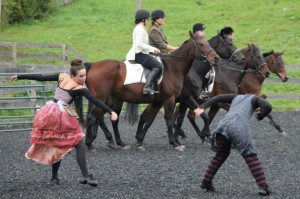
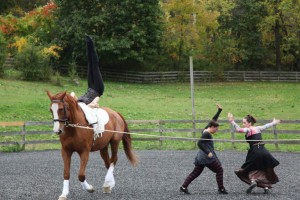
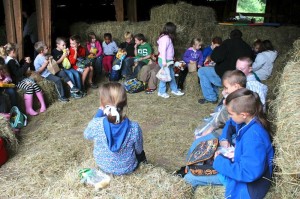
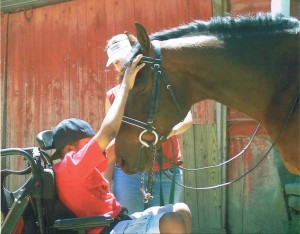
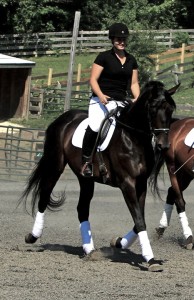

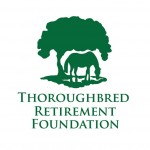
I work with children on a daily basis–what a wonderful program Little Brook Farm offers. Wish I was closer to include her in our library programs!
We definitely could. Where are you located?
This story gave me goosebumps and reminded me of the good that is still in the world. I love that they not only rescue the horses, but,kids and education is involved too. Bless them! Wonderful story, wonderful people! LOVE!!
Amy and TBDancer, thanks for your comments! I think heaven would look a lot like Little Brook Farm. It sounds amazing. Lynn is so innovative with her curriculum, and so kind to her equine partners.
As a former teacher, I read this particular entry with special interest. The bond between animals and humans–especially troubled ones, either species–can make such a difference, and how lucky EVERYONE in this blog has been to make the connection. Win-win, all around. Thanks, Susan, for writing this story, and thanks to Lynn Cross for sharing her dream with so many people.